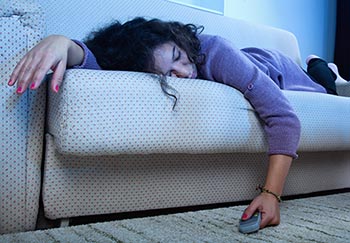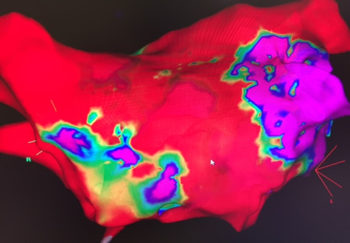
Our bodies do all kinds of weird things. How do you know when to ignore something and when to get to the doctor ASAP? We break down what’s normal and what’s not in this occasional series.
Most of us have experienced the pins-and-needles feeling. Maybe you slept on your arm, or you squeezed into an awkward position in a tiny airplane seat and your foot fell asleep. The next thing you know, the limb is tingling, almost like it’s pulsing from inside, and you can’t really do anything with it.
What Causes the Pins-and-Needles Feeling?
Any tingling or numbness indicates a problem with your nerves. “The nerves are like electrical wires that connect every part of your body to the brain,” explains Andrew Chang, MD, a primary care doctor at Medical Associates of Louisa. If you compress the nerves, like when you fall asleep on your arm, the nerves can’t send the signals to your brain as effectively.
Usually, we can easily figure out the cause:
- Falling asleep in an awkward position, with pressure on your foot or arm
- Sitting or standing in one position for a long time
- Tight clothing
Most instances of pins and needles last for brief periods of time and cause no lasting harm. But once in awhile, the sensation signals something more serious.
Weird symptoms?
Make an appointment with a UVA primary care doctor.
When the Tingling Needs Medical Attention
If you can easily identify the cause of your pins and needles or numbness, and it only lasts for a few seconds, there’s no need to worry. But see your doctor if:
- The feeling persists or keeps recurring.
- You’re experiencing it with symptoms such as dizziness, balance issues and weakness.
- It’s not just happening in one part of the body.
- You can’t figure out the cause.
What Could the Pins-and-Needles Feeling Mean?
Several conditions can cause the pins-and-needles feeling.
Diabetes, for instance, causes nerve damage because your vessels and nerves become inflamed. When inflammation strikes blood vessels, the nerves don’t get enough blood, Chang explains.
Vitamin deficiencies, on the other hand, destroy the myelin that covers and protects the nerves. If severe, the damage can last, permanently.
Tingling and numbness in the wrists and hands could signal carpal tunnel syndrome, a common nerve disorder of the hand.
There are plenty of good reasons to avoid overindulging in alcohol, but here’s another one: If you’re drunk, you can experience radial neuropathy, also known as Saturday night palsy. This occurs when someone falls asleep with their arm hanging over the edge of the chair, couch or bed. A sober person soon realizes this is uncomfortable and adjusts, but a drunk person may sleep that way for a long time.
In serious cases, the blood supply cuts off, causing serious and permanent nerve damage. As a result, you’ll have trouble feeling and moving part of your arm. Fortunately, this is rare, Chang says.
Other conditions your doctor will check for:
- Thyroid problems
- Potassium or sodium imbalance
- Infection around the nerves
- Tumors
- Infections such as HIV, syphilis or Lyme disease
- Hepatitis
If your bloodwork and vitamin levels test normal for these, Chang says your doctor will refer you to a neurologist for nerve tests.


Hi, I was diagnosed in Jan. 2017 with Peripheral Neuropathy. It started n my toes and really flared up in Oct. 2017. I have had many test’s etc. which all came back alright, good but frustrating because I get no real answers ! I now have tingling in the ball of my feet and heels often, also numbness and burning in my fingers at times. I am taking Pregabalin 75mg (2daily, I at night) and Duloxetine 30mg (1 daily) also Lipoic Acid, Turmeric, Vit. B12 and Ginko Biloba. Do you know of anything else that could be useful? Any suggestion’s would be appreciated! Regards from OZ.
I woke up at 8 am my left arm was hurting down to my hand I had to use my right arm to move my left it’s not so painful now however I still have numbness in my hand an wrist an pins an needles should I be concearnef
Sorry, but we can’t give medical advice on the blog. We recommend you check in with your primary care doctor.
Is there a test for Lymes disease
Untreated anemia can manifest as pins and needles sensations in the hands and feet.
Get pins and needles in both hands and like to know why
After spinal surgery my hands now have the feeling of sand in them and some numbness. While-in rehab I noticed they looked older. fingers look as though I’ve been in water too long .
I’m still working on walking using a cane